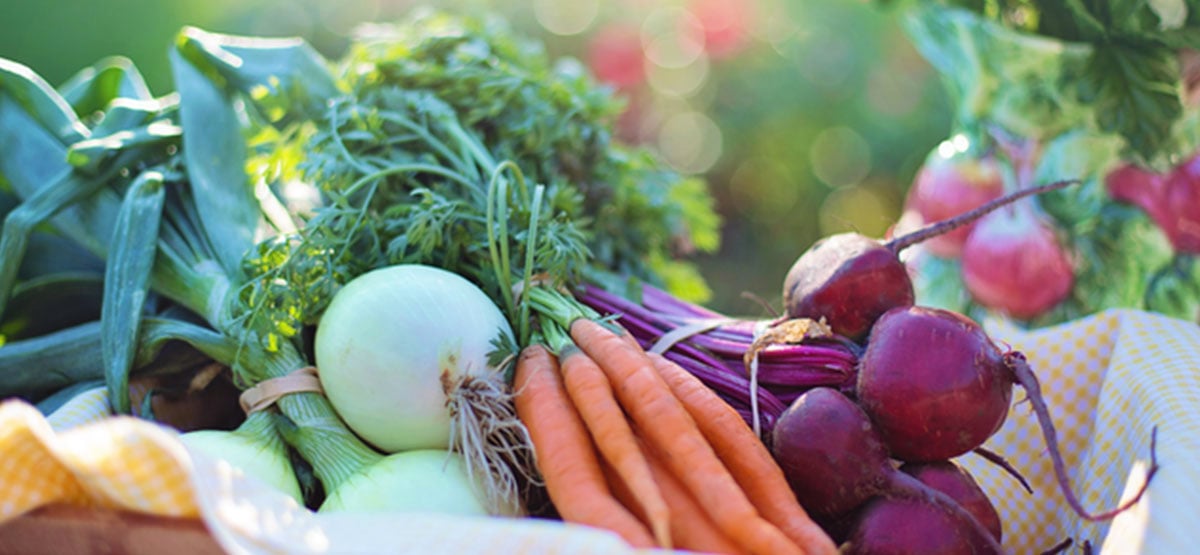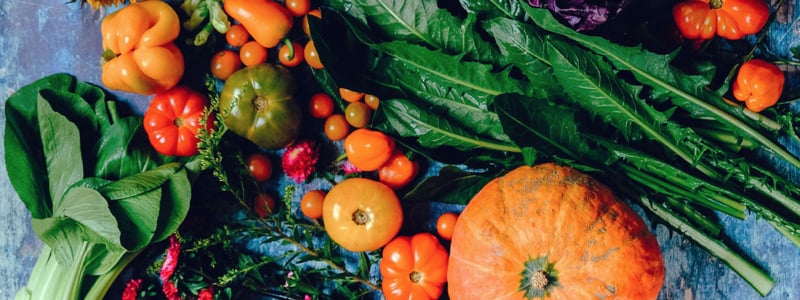Autumn signals the coming of winter to our bodies – and with that comes the desire to consume more energy-dense foods like fats and carbs. While (sadly) humans don’t get to hibernate, the coming of colder weather and fewer hours of sunshine mean we find ourselves craving warming, stodgy meals.
Let’s feed these cravings with seasonal autumn foods for maximum nourishment.
Key takeaways
Skim-friendly highlights to take away.
- Autumn brings fresh, flavourful seasonal veg in the UK at its nutritional peak.
- Squash, pumpkin, carrots and leafy greens like kale and spinach deliver essential nutrients.
- Choosing seasonal produce cuts food miles and reduces your carbon footprint.
- Eating with the seasons supports local farmers and communities.
- Seasonal fruit and veg are often more affordable thanks to lower storage and transport costs.
- Autumn produce lends itself to comforting, hearty recipes perfect for cooler days.
- Staying hydrated and eating a variety of seasonal foods helps keep nutrition balanced.
What foods are in season during the UK autumn?
Seasonal foods include:
- Apples
- Blackberries
- Elderberries
- Lettuce
- Marrow
- Mushrooms
- Pears
- Plums
- Potatoes
- Pumpkin
- Rocket
- Squash
- Sweetcorn
- Watercress
Eating seasonally over the autumn
A healthy, seasonal diet in autumn might be a mixture of the following:
- Root vegetables: carrots, squash, pumpkin and sweet potato
- Whole grains: brown rice, quinoa, oats and millet
- Legumes: beans, chickpeas, lentils, soybeans.
- Green vegetables: broccoli, spinach, kale, celery, rocket and artichokes
- Fruit: apples, pomegranates, citrus fruits and pears
- Fish: sea bass, cod, sole and haddock
- Herbs: ginger, turmeric, cinnamon, rosemary, thyme, basil and dill.
Tips for eating seasonally this autumn
- Focus on in-season produce such as sweet potatoes, squash, apples, dark leafy greens, beets and cook comforting foods like homemade soups and stews. These will help curb unhealthy cravings while providing plenty of nourishment.
- Sneak as many fibre-filled vegetables into your autumn diet as you can with hearty soups. Add any greens, beans, lentils, whole grains, and veggies you may have along with protein, like chicken, prawns or tofu.
- Get your vitamins with the citrus fruit that’s abundant in the colder months. Snack on oranges or make a delicious salad with some citrus and winter greens like kale.
- While craving carb-rich food is natural and you shouldn’t deprive yourself, try and make healthy swaps when you can. For instance, a warming bowl of pasta and cheese can be made healthier by switching to a wholegrain pasta and adding a variety of roasted winter vegetables.
- Make sure to drink plenty of water. Dehydration is actually common in cooler months as the lack of hot weather can fail to signal our thirst and ensure we’re drinking enough.
Why is eating seasonally so important?
It’s more environmentally friendly and sustainable
When food has to travel a long way to get to the UK, it often comes with a larger carbon footprint. When you buy seasonal food, you’re helping to reduce the demand for out-of-season produce that needs to be transported from other countries. This helps to reduce the energy and greenhouse gases released through refrigeration, transportation, artificial hothouses, fuels and much more.
When you eat seasonally, the food you eat is more likely to have been produced locally. This means that not only does it have a much shorter distance to travel (making it more environmentally-friendly and sustainable), but it is fresher and more nutritious. Additionally, you are also helping to support local farmers and the local community.
It tastes better
Food that is grown and picked in season will taste much riper, fresher and sweeter. Food transported long distances is often picked ahead of its ripeness so that it doesn’t arrive in the UK overripe and unusable – this means it isn’t picked at its optimal stage and won’t taste as good.
When you eat locally, the time it takes for food to get from the ground to your table is drastically lower, meaning it’s fresher and tastier.
It’s more nutritious
As many nutrients in produce decline over time, long transportation means that by the time you receive it, many of the nutrients have been lost. By eating seasonal foods, you are more likely to get the full nutritional benefits.
It’s more affordable
Eating local food that’s in-season pushes down the cost of food as there’s no large transportation or storage costs. Usually when there’s a large harvest of in-season produce, cost naturally decreases.
At David Lloyd Clubs, we serve a number of nutritious and delicious dishes packed with seasonal food. Find out more about our food menu.
You can also find a number of seasonal autumnal recipes to try at home. Our favourites include the vegan pumpkin and lentil salad and this delicious beetroot, orange and halloumi recipe.






